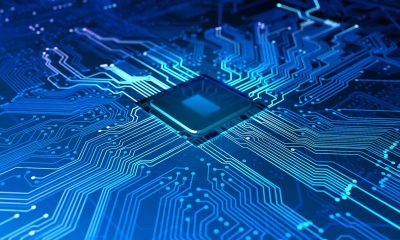Entertainment
Could humans have babies in space safely? Here’s what we know.

The recently married couple tip their bellhop, drop their suitcases, and breathe out a sigh as they fall back on the bed. They had wanted a gramworthy honeymoon, and for a few million dollars, they’ve got it.
Once their initial travel sickness wears off, they’re feeling as frisky as any other newlyweds. Perhaps the only thing that could distract them from the marital act now is that incredible cabin view of infinite space, and the faint reminders of civilization glinting at them from Earth, some 250 miles below.
If space hotels come to fruition in the coming years or more realistically decades, cosmic vacations won’t be a sci-fi fantasy. Even without hotels, longer orbital space flights all but guarantee tourists opportunities to join the 60-miles-high club. It’s the “souvenirs” these couples could bring home that have a few researchers worried — enough to publish a public report on the risks associated with human conception in the future space tourism sector.
Bottomline: No one knows whether babies could be conceived in space without detrimental consequences to their health — there simply isn’t enough research. While professional astronauts likely have a good grasp on why they shouldn’t set out to make a starchild, less-informed travelers might not demonstrate the same level of restraint.
“It’s going to be a very strong magnet for these couples. They’ll want to be maybe in the history books, like, ‘Hey, we created the very first naturally conceived baby in space,'” said Egbert Edelbroek, CEO of the space research company SpaceBorn United and one of the co-authors, “but they shouldn’t want to.”
The paper published in April captured some buzz — even some snickers from late-night host Jimmy Kimmel, who called them “nine very lonely authors” — for broaching a little-discussed issue. Though the intent was to get the burgeoning space tourism sector to think about how to discourage space sex that leads to pregnancy (Not sex altogether, one of the researchers assured Mashable. They’re not prudes.), the topic brings into focus an existential problem: How could humans ever leave Earth in the event of a global crisis if people don’t know how to procreate in space or any other world?
SpaceX founder Elon Musk has said his ultimate vision is to use a fleet of Starships to send 1 million humans to Mars by 2050. But if those pioneers die off because they can’t have children, or healthy children, what’s the point?
“They’ll want to be maybe in the history books, like, ‘Hey, we created the very first naturally conceived baby in space,’ but they shouldn’t want to.”

Will the first long-duration space journeys involving astronauts and their descendants have to be planned as one-way trips?
Credit: Steven Hobbs / Stocktrek Images via Getty Images illustration
Gravity and radiation levels pose challenges
In spaceflight, humans are exposed to different levels of gravity — sometimes less, sometimes more. Think about those roller coaster warnings at amusement parks prohibiting pregnant people from riding. They’re in part because extra G-forces can lead to premature separation of the placenta from the wall of the uterus.
On the other hand, little or no gravity like on the International Space Station presents its own challenges: For the past 60 years, NASA has been working on how to keep adults healthy in weightlessness. As it is, astronauts are expected to exercise at least two hours a day on a treadmill or stationary bicycle to combat bone and muscle deterioration.
Research also suggests that cosmic radiation, like other sources of radiation, could damage DNA, reproductive organs, and sperm and egg cells. In women, depending on the amount of exposure, that might mean sterility, ovarian failure, and cancer, which may lead to early menopause or death. In pregnancy, the risks could include miscarriage and premature births. For men, too much radiation could also lead to reduced sperm count or sterility, though some scientific findings indicate sperm could be safely stored in space for a time.
When it comes to embryos and fetuses, the news is just as grim. Radiation can cause growth delays, cognitive impairments, deformities, and higher risks of newborn death.
“We’ve got some ideas that there will be quite a lot of negative issues in the development of bones and musculature,” said David Cullen, professor of astrobiology and space biotechnology at Cranfield University in the United Kingdom. “And all these other kinds of things inherently are driven by a combination of genetics, biochemistry, and responses to the local environment. So if you change that local environment, you expect all of those development states to be affected in some way — and, most likely, in a negative way.”
Want more science and tech news delivered straight to your inbox? Sign up for Mashable’s Light Speed newsletter today.
Startup seeks to make reproduction in space work
The Dutch entrepreneur Edelbroek wants to make human reproduction possible in space by first taking sex out of the equation. His company, SpaceBorn United, may be the first in the world planning space-based research on in vitro fertilization, though it’s hard to know what the often-secretive Chinese government may be doing.
Through a series of missions, the startup wants to conduct experiments observing the effects of partial gravity on embryo development. The company, which has about 30 mostly part-time employees now, would start with animal studies before advancing to human cells. In August, SpaceBorn United partnered with Independence-X, a Malaysian space exploration company, to conduct a suborbital drop test of its re-entry capsule containing biological samples.
So far SpaceBorn United has developed a miniature IVF and embryo incubator using microfluidics technology. The prototype hardware, which looks like a CD, has multiple tiny channels that hold sperm and eggs. The disc spins to simulate different loads of gravity while the device automatically impregnates embryos. Now the venture is working with a German company, Atmos Space Cargo, to launch mouse embryos on an orbital test flight by the end of next year, Edelbroek said.

SpaceBorn United has developed a miniaturized IVF and embryo incubator using microfluidic technology.
Credit: SpaceBorn United illustration
The logistics of doing these experiments are complicated. Because the team needs to work with freshly harvested female cells, the company must have last-minute access to the rocket payload, making ride-sharing programs unfeasible. The cells only remain fertile for four to six hours.
But private industry will have to lead the way on space reproduction research, he said, because NASA and other government space agencies have onerous political challenges to navigate before engaging in such studies. In the United States, for instance, sex is already a taboo subject. Add on top of that the nation’s complex culture war over reproductive rights, and the hurdles are monumental. Experts say the U.S. space agency isn’t likely to get Congress on board with funding such endeavors.
They “can only work with baby steps — with fruit flies and frog eggs and some rodents — and never, never even speak about doing it with human reproductive cells,” he said.

While the experiment was largely deemed a reproduction success story in the mass media, tadpoles raised in microgravity were documented as having enlarged heads and eyes in scientific journals.
Credit: Tom Trower / NASA Ames Research Center
Most of the company’s investors are in the fertility sector because of the potential to improve assisted reproductive technology on Earth. They’ve also received interest in collaborating from neophyte spacefaring nations, such as the United Arab Emirates, that may want the prestige of being involved in a first like human embryo conception in space.
In the same vein as the space burial market, SpaceBorn United anticipates there will be affluent customers interested in paying for space-fertilized babies long before humans are even living somewhere beyond Earth.
“We’ve had other suggestions, like space cats and dogs,” Edelbroek said.

The prototype hardware, which looks like a CD, has multiple mini channels that hold semen and eggs.
Credit: SpaceBorn United
Ethics of human reproduction research in space
Though the ultimate goal may be to one day make natural conception and childbirth possible in space, doing so won’t be possible anytime soon, said Alexandra Proshchina, a neuroscientist at the Petrovsky National Research Center for Surgery in Moscow.
She and her colleagues have worked on animal reproduction studies in microgravity through several missions organized by the Institute of Biomedical Problems. In the 1990s, they participated in a Russian-Canadian experiment on the BION-10 biosatellite involving clawed frog tadpoles and an 11-day Russian-American experiment on space shuttle Atlantis centered on the development of rat embryos.
“(They) can only work with baby steps — with fruit flies and frog eggs and some rodents — and never, never even speak about doing it with human reproductive cells.”
Then in 2014, along with Rustam Berdiev, a physiologist at the Lomonosov Moscow State University, they performed the world’s first attempt to mate ornate day geckos in spaceflight on the Russian FOTON-M4 satellite, though the lizards died due to difficulties with the mission. The team has since started preparing an orbital experiment involving veiled chameleon embryos, but the project has stalled, in part because of funding challenges, researchers told Mashable.

Likely private industry will have to lead the way on space reproduction research because NASA and other government space agencies have political challenges to navigate before engaging in such studies.
Credit: DEA / L. RICCIARINI / De Agostini via Getty Images
During pregnancy, women adapt to changes in body mass, hormone levels, metabolism, and a host of other biological processes that put significant strain on their bodies. Even astronauts at peak fitness get spacesick, said Proshchina, who, along with morphologist Victoria Gulimova, responded to Mashable in writing to overcome translation issues.
“Subjecting pregnant women to such physical stress is not very humane,” Proshchina said. “Moreover, it would be unacceptable to put the baby at risk.”
Even if a baby could be delivered safely in space, scientists know even less about the impacts of the space environment on children and teenagers, said Alex Layendecker, a former Air Force space operations officer with a doctorate in human sexuality. He has recently founded the Astrosexological Research Institute, a nonprofit organization aimed at facilitating studies of sex and reproduction in space.
Cell division is more rapid in children than adults. When ionizing radiation penetrates a human body, it destroys bonds and can lead to cancer. If a child were to develop cancer, it might spread faster in outer space conditions than it would for an adult, he said.

Even if a baby could be delivered in space, scientists know even less about the impacts of the space environment on children and teenagers.
Credit: A. Martin UW Photography via Getty Images
In terms of ethics, taking a minor away from the planet, even just for a space cruise, would cross a line, given the lack of data: Children can’t provide informed consent, yet their lives likely would be at a much higher risk of negative impacts, he said.
Whether a human conceived and born in space would be able to adapt to other planets is a looming unknown. It’s not even clear whether such a child could survive on Earth after coming home, said Gulimova, who also works at the Petrovsky National Research Center for Surgery.
Or, would the first long-duration space journeys crewed with astronauts and their descendants have to be planned as one-way trips?
“There are many questions, and many more ground-based and orbital experiments that will have to be carried out, before happy parents on board the spacecraft hear the first cry of the first citizen of the Universe,” she said.
-

 Entertainment6 days ago
Entertainment6 days agoiPad Pro 2024 now has OLED: 5 reasons this is a big deal
-

 Entertainment6 days ago
Entertainment6 days ago‘Stardew Valley’ has an official cookbook. Here’s how to make Seafoam Pudding.
-

 Business6 days ago
Business6 days agoLegion’s founder aims to close the gap between what employers and workers need
-

 Business5 days ago
Business5 days agoCheckfirst raises $1.5M pre-seed, applying AI to remote inspections and audits
-

 Business4 days ago
Business4 days agoAI chip startup DEEPX secures $80M Series C at a $529M valuation
-

 Business4 days ago
Business4 days agoRetell AI lets businesses build ‘voice agents’ to answer phone calls
-

 Entertainment3 days ago
Entertainment3 days ago'House of the Dragon' recap: Every death, ranked by gruesomeness
-

 Entertainment3 days ago
Entertainment3 days agoJinkx Monsoon promises ‘the queerest season of ‘Doctor Who’ you’ve ever seen!’


























